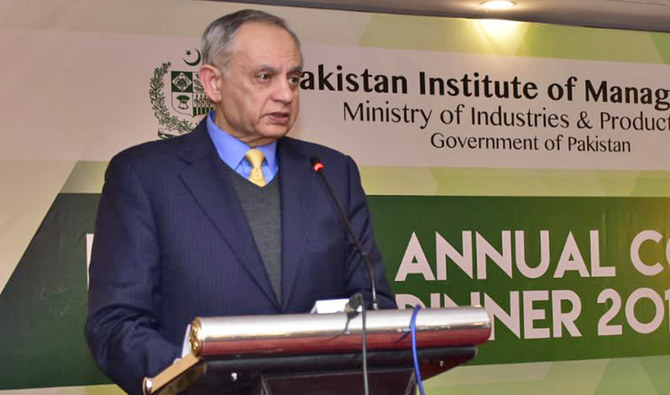KARACHI: Prime Minister Imran Khan’s adviser on commerce and industry, Abdul Razak Dawood, will leave for Kabul on a three-day visit today, Thursday, for talks on enhancing trade between the two neighbors.
Pakistan has said it plans to increase the volume of bilateral trade with Afghanistan, which stood at $2 billion in 2019, to $5 billion in the next five years.
Dawood’s visit comes just weeks after his Afghanistan counterpart, Nisar Ahmad Faizi Ghoryani, met Prime Minister Imran Khan to discuss trade ties.
Traders have long urged officials in Kabul and Islamabad to ease border measures to expedite the movement of goods between the two countries, a process that has slowed down even further in recent months due to new rules introduced to curb the spread of the coronavirus pandemic.
“The agenda of the visit will focus on three points,” Dawood told Arab News on Wednesday. “Number one is bilateral trade and how we are going to improve it between the two countries; the next one is the Afghan Transit Trade (ATT); and the third is to focus on many technical issues at the border crossing that need attention.”
“Our [bilateral trade] target for the next five years is $5 billion,” Dawood said. ”It used to be $2 billion or so and went down, though now it is back up again. We will do it.”
He said Pakistan had already taken several measures to address border problems, adding that more initiatives would be discussed during his meeting with Afghan officials.
“Border issues need to be resolved, though a lot of them have already been sorted out and only a few of them are left,” Dawood said.
On the Afghanistan-Pakistan Transit Trade Agreement (APTTA), which allows Kabul to use Pakistan’s land to transport goods to India, the adviser said the pact would be reviewed in February 2021.
“The ten-year agreement is coming to end, and we will start it with another agreement that both sides are negotiating to finalize,” Dawood said.
Signed in 2010, under APTTA goods are taken to the Wagah crossing point using Pakistan’s territory from where Indian trucks transport them to their intended destinations. Pakistan does not allow import of goods from India to Afghanistan via land route.
Dawood said he would also take a delegation of Pakistani businessmen to Afghanistan during his next visit to help them explore new opportunities, though his three-day visit starting today will only include government-to-government interactions.
Stakeholders say the potential for bilateral trade between Afghanistan and Pakistan is much more than $5 billion.
“There are a lot of issues when it comes to bilateral and trilateral trade. We have to export to the Central Asian countries, but there are issues. We have issues of transit trade and exports,” Mohammad Zubair Motiwala, chairman of the Pakistan-Afghanistan Joint Chamber of Commerce and Industry, told Arab News.
“The $5 billion [target] is the minimum potential of bilateral trade,” he added. “If trade-related issues are resolved, the volume can even be enhanced to $10 billion.”















